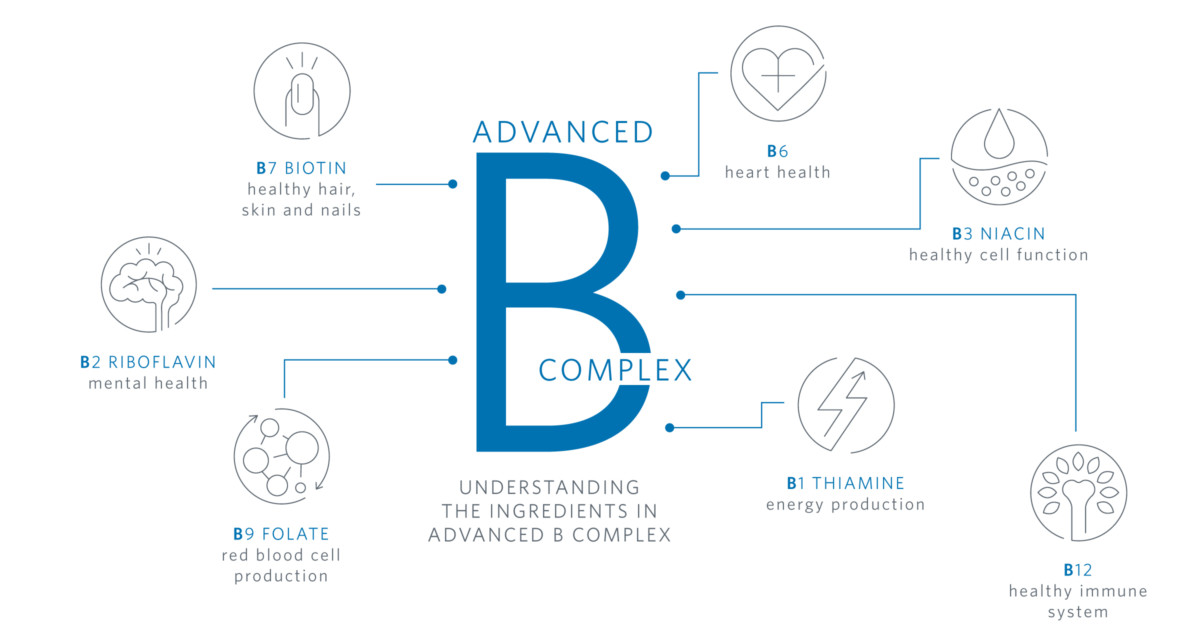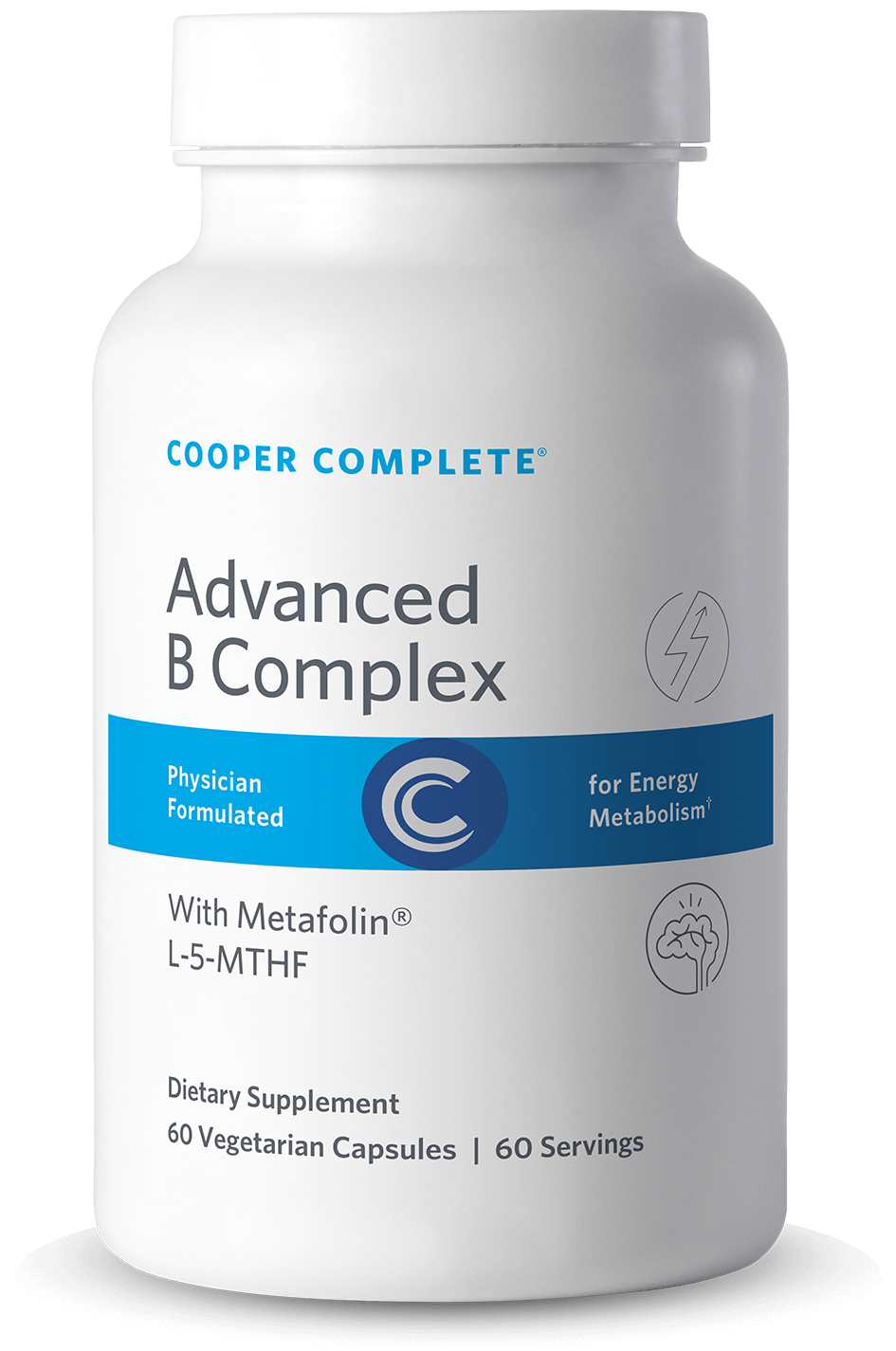Learn About The Health Benefits of B Complex Vitamins

You may be familiar with vitamins B6 and B12, but did you know there are actually eight B vitamins? Once thought of as a single nutrient, the health benefits of B vitamins provide unique health benefits and functions in the body. B vitamins convert the food we eat into fuel (energy) which the body uses to support brain function and promote optimal heart health and healthy skin. Unfortunately, our body doesn’t produce B vitamins, so we must get them through our diet or supplementation. Because B vitamins are water-soluble and not stored in the body, they must be replenished daily.
Healthy B Vitamin Levels Can Protect Aging Brains
Recent studies suggest B vitamins protect brain function over time. Optimal B-vitamin status is associated with better cognitive health in aging. A recent clinical trial provided evidence that supplementation with folic acid and related B vitamins over a two-year period reduced global and regional brain atrophy, as measured by MRI scans in older adults. Besides supporting brain health, each B vitamin plays a different role in supporting overall health.

Advanced B Complex Supplement
Advanced Vitamin B Complex supplement contains the activated, methylated, most easily absorbable forms of eight essential B vitamins, including biotin and folate, to support cellular energy production and immune, cardiovascular, and neurological health.†
$23.68 Add to cartVitamin B1 (thiamin)
Vitamin B1, also known as thiamin and thiamine, is an essential nutrient that enables the proper function of all the body’s tissues and helps the body convert food into energy. Older adults, individuals with diabetes, those who have undergone bariatric surgery and heavy drinkers are at the highest risk of developing low thiamin levels. Small amounts of thiamine are naturally occurring in fish and mussels, pork, chicken and beans. Brown rice has a small amount of thiamine, but white rice is an excellent source of thiamine. Fortified breakfast cereal and bread are the most common sources of thiamine in the average American diet.
Vitamin B2 (riboflavin)
Riboflavin aids in metabolic processes within the body and promotes proper cell function and energy production. Vitamin B2 is used to treat acne and muscle cramps as well as prevent migraine headaches. Vegans, individuals who consume little dairy and athletes who are vegetarians are most likely to have too little riboflavin. Milk, meat, eggs, nuts, green vegetables and enriched flour are food sources containing riboflavin.
Vitamin B3 (niacin)
Niacin acts as an antioxidant and plays a crucial role in cell signaling, DNA repair, lowering cholesterol and managing arthritis symptoms. Chicken and turkey breast meat, beef, salmon and tuna provide 5-10 mg of niacin per 3-ounce serving, while nuts, legumes and grains contain smaller amounts of niacin. Many commercial bread and breakfast cereals are fortified with niacin.
Vitamin B5 (pantothenic acid)
This B vitamin is necessary for blood cell production, supporting a healthy digestive tract and contributing to the proper function of the nervous system. Vitamin B5 is also responsible for producing sex and stress-related hormones and promoting healthy skin, hair and eyes. Almost all animal- and plant-based foods contain pantothenic acid. Fortified breakfast cereals, shiitake mushrooms and sunflower seeds are excellent sources of vitamin B5.
Vitamin B6 (pyridoxine)
Vitamin B6 is crucial for brain development and metabolism. While its primary role lies in creating neurotransmitters and regulating homocysteine levels, vitamin B6 also supports a healthy immune system. Fortified cereals, poultry and beef, starchy vegetables (especially potatoes) and some non-citrus fruits such as watermelon and raisins are the most common sources of vitamin B6.
Vitamin B7 (biotin)
Biotin is well-known for its link to hair, skin and nail health but this B vitamin also helps form the building blocks of enzymes to break down food. Those with chronic alcohol consumption can find themselves at a greater risk of biotin deficiency due to its inhibiting absorption. The NIH reports up to a third of pregnant and breastfeeding women can develop a slight biotin deficiency even when consuming (through diet or supplementation) the recommended amount of biotin.
Most biotin in a healthy diet comes from meat. Beef liver has a lot of biotin, with more than 30 mcg per 3-ounce serving. Whole eggs are a good source of biotin—a 3-ounce portion of whole cooked eggs contains 10 mcg of biotin. Pork chops and hamburger patties have approximately 4 mcg per 3-ounce serving, and seeds, nuts and some vegetables—including sweet potatoes, spinach and broccoli—have smaller amounts of biotin.
Vitamin B9 (folate (natural) and folic acid (synthetic))
Folate is critical for cell growth and DNA formation. In addition, folate works to regulate homocysteine levels throughout our lifetime. As an amino acid in the blood, higher than average amounts of homocysteine are directly related to heart disease. While not directly linked to preventing heart disease, folate effectively lowers homocysteine levels in the body. Folate also helps the brain improve mood naturally. In individuals who are depressed, low levels of folate may prevent the brain from making enough neurotransmitters. The L-methylfolate form of folate (found in Cooper Complete supplements) can help antidepressants work more efficiently. 7.5 to 15 mg (7500 to 15000 mcg) of L-methylfolate has been shown to enhance antidepressant response. Learn more about the health benefits of folate.
Folic acid and folate are commonly used in place of each other when referencing vitamin B9.
- Folate: Naturally occurs in foods and bioavailable supplement forms, folate encompasses all types of vitamin B9.
- Folic Acid: The synthetic form of folate found in many supplements, fortified cereals, bread, pasta and rice, folic acid refers to one unique form of vitamin B9.
So, while folic acid is always folate, folate is not always folic acid.
Most foods contain some folate, including meat, poultry, eggs, dairy products, seafood, grains, fruits and vegetables. Spinach and other dark leafy vegetables, black-eyed peas, white rice, asparagus and brussels sprouts have some of the highest folate levels. To reduce neural tube congenital disabilities, the U.S. Food and Drug Administration mandated in 1998 that fortified cereals and grains contain 140 mcg of folic acid per 100 grams of flour. Fortified foods are a significant portion of daily folate intake for most adults.
The folate in Cooper Complete supplements is the active form, L-5-MTHF (Metafolin®). This active L-methylfolate form of folate crosses the blood-brain barrier and is thought to help the body produce serotonin, norepinephrine and dopamine. Importantly, Metafolin® folate does not mask a vitamin B12 deficiency as many forms of folic acid do.
Vitamin B12 (methylcobalamin (natural) and cyanocobalamin (synthetic))
Vitamin B12 aids in cell metabolism, nerve function and DNA production. Contrary to popular opinion, taking enormous amounts of B12 does not increase energy levels. The NIH states, “except in people with a vitamin B12 deficiency, no evidence shows that vitamin B12 supplements increase energy or improve athletic performance.” This misconception of energy production stems from vitamin B12’s role in helping cell metabolism throughout the body. While a deficiency of B12 can lead to tiredness or weakness, returning to healthy levels of B12 restores normal energy levels and does not further boost energy. Learn more about vitamin B12 deficiency.
Older adults, those with pernicious anemia, gastrointestinal disorders such as celiac disease and Crohn’s disease, those who have had gastrointestinal surgery for weight loss or to remove a portion of the stomach, vegetarians and vegans are at higher risk for vitamin B12 deficiency. Vitamin B12 is only found naturally in animal protein, fish, milk, eggs and dairy. Nutritional yeast and cereals are fortified with vitamin B12. Interestingly, vitamin B12 in dairy products is almost three times more bioavailable than the B12 in other food sources. The bioavailability of supplements is about 50 percent higher than food sources.
The following amounts of each B vitamin are recommended for adults and children aged 4 and older:
- B1 (thiamin): 1.2 mg/day
- B2 (riboflavin): 1.3 mg/day
- B3 (niacin): 16 mg/day
- B5 (pantothenic acid): 5 mg/day
- B6 (pyridoxine): 1.7 mg/day
- B7 (biotin): 30 mcg/day
- B9 (folate (natural) and folic acid (synthetic)): 400 mcg of Dietary Folate Equivalents (DFE). 1 mcg DFE equals 1 mcg of food folate, 0.6 mcg folic acid from fortified foods or supplements consumed with food and 0.5 mg folic acid from dietary supplements taken on an empty stomach
- B12 (methylcobalamin (natural) and cyanocobalamin (synthetic)): 2.4 mcg/day
Cooper Complete offers a variety of supplement options for reaching your daily vitamin B intake goals. The following table shows the amount per serving of B vitamins in Cooper Complete’s products.
B Vitamins in Cooper Complete Supplements |
||||||||
|---|---|---|---|---|---|---|---|---|
| Vitamin or Supplement | Thiamin | Riboflavin | Niacin | Pantothenic Acid | B6 | Biotin | Folate | B12 |
| Advanced B Complex | 50 mg | 50 mg | 50 mg | 50 mg | 50 mg | 75 mcg | 680 mcg DFE (400 mcg (L-5-MTHF) | 500 mcg |
| Original Multivitamin | 3 mg | 10 mg | 20 mg | 10 mg | 10 mg | 300 mcg | 333 mcg DFE (200 mcg (L-5-MTHF) | 400 mcg |
| Basic One Multivitamin | 1.5 mg | 2 mg | 20 mg | 10 mg | 10 mg | 333 mcg DFE (200 mcg (L-5-MTHF) | 400 mcg | |
| B12 Methylcobalamin | 1000 mcg | |||||||
| Dermatologic Health | 6000 mcg | |||||||
| Methyl Folate (L-5-MTHF) 5000 mcg (5 mg) | 8333 mcg DFE (5000 mcg (5 mg) L-5-MTHF) | |||||||
As a reminder, your health care provider understands your health profile best, including your medical history, risks and current medication and supplementation use. Talk with your physician about which B vitamins may be right for you.
